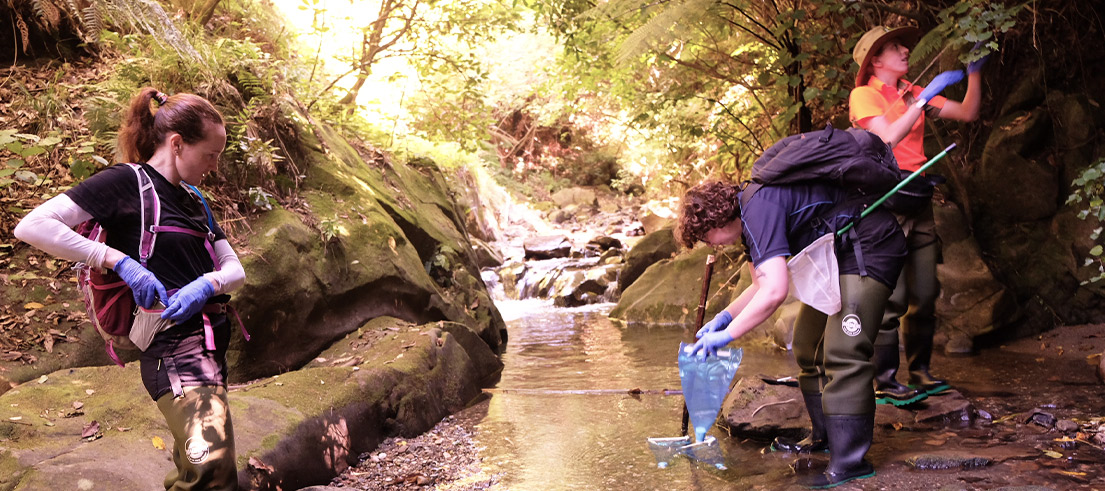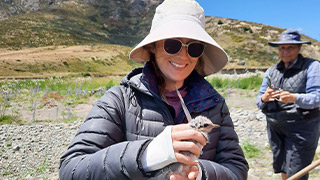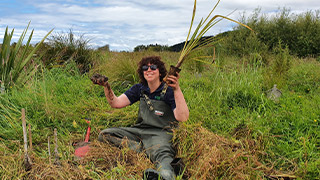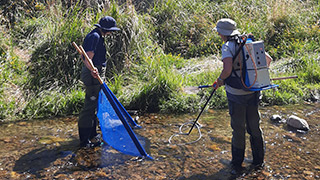
Summer students getting the full experience in Kaikōura
Our summer student programme offers work experience for those wanting to learn more in the environmental space. Hear from two students who have spent time in Kaikōura.
For Abby Clarke and Alana Kimber, spending the three months working in Kaikōura was the ideal option for their summer.
The pair, both keen environmentalists, enrolled in our summer student programme and were thrilled to be placed in the coastal town.
Alana and Abby have been helping with two projects – the Banded Dotterel Study and fish passage assessment work, through our regional biodiversity programme.
We’re proud to be supporting groups such as the Banded Dotterel Study. The often-voluntary mahi of these groups and their members helps raise awareness and reduce threats to our vulnerable plant and animal species.
Meet Alana Kimber
Alana studied Environmental Management with a Water Management Major at Lincoln University. Having graduated mid-way through last year, she was looking to gain some experience over summer.

Alana Kimber holding a black-fronted tern chick
"Last year I worked at the Tasman District Council, so I decided Canterbury would be a good next move for me," she said.
"For our work with the Banded Dotterel Study, we’ve been out on beaches, identifying birds, helping band them, and checking in to see which ones have survived the season."
The fish passage assessments include a mixture of office and outdoor work – looking at where fish access to upstream areas might be challenged.
"We started by scanning Canterbury Maps, looking to see where things like roads or railway lines intercept with waterways. Structures like culverts, dams, and bridges can impede fish passage," she said.
Alana said they then go out in the field to assess the barrier, looking at ways in which the barrier can be modified to allow fish to pass.
"So, we’re up underneath bridges, getting dirty and wet. It’s good fun," she added.
Alana is hoping to continue doing hands-on environmental biodiversity work after the programme finishes. And in the long-term, she’s eyeing up further study on bushfire planning in Australia.
Meet Abby Clarke
Abby’s love for nature really flourished at university. She started out studying chemistry at the University of Otago in Dunedin, but quickly realised it wasn’t for her. Friends suggested she take up a zoology paper, and she said she hasn’t looked back since.
"I’m now doing my master’s in wildlife management, centred around yellow-eyed penguins and how to improve outcomes from their stay in rehabilitation services," she said.
The summer student programme provided a much-needed break for Abby, and an opportunity to gain some experience.

Abby Clarke at Nagari Wetland
"The summer student programme was exactly what I was looking for – intertwining my background with birds, volunteering and learning new skills I’ve been hoping to gain, in freshwater management," she said.
Kaikōura also provided a beautiful background for the work.
"It’s gorgeous here, and so much warmer than Dunedin. I’m really interested in marine life, so on the weekends I get out my snorkel and go exploring in the rockpools. I also like going foraging – there are some great plums around at the moment."
Abby is grateful to everyone in the Kaikōura office for making her stay so welcoming.
"Everyone has truly been amazing, and a special thanks goes to Heath Melville, who has gone above and beyond to provide us with lots of amazing opportunities," she said.
When her tenure in Kaikōura finishes, Abby will be heading back to Dunedin to finish her master’s and hopes her future work will be similar to the mahi they’ve undertaken with the Banded Dotterel Study.
"This experience has really opened my eyes to the opportunities regional councils can offer, and so if the opportunity arises, I’d love to work for one again," she added.
"I would love to do exactly what we’ve been doing there – have a population of birds, or an ecosystem that requires quite intensive management, go out, do the work/mahi, talk to people and get the wheels moving on projects," she said.
Banded Dotterel study brings home vulnerability of species
Abby said their banded dotterel surveying really brought home how tough it is for the species.

Abby undertaking electric fishing in Irongate Stream
"In South Bay we had 53 nests over the season. Each nest had three eggs, yet only six of them have made it through the season, two more are uncertain but it’s unlikely they survived," she said.
That experience has strengthened her resolve in wanting to help protect dotterels and other wildlife.
"The single biggest threat to the dotterels in Kaikōura are cats. They’re also threatened by irresponsible use of their beach and dune habitat, such as letting dogs roam off their leashes, driving vehicles on the beach and dunes and people not staying away from marked nests.
"These threats aren’t unique to the dotterels but show why it’s so important to do our best to reduce our impact. Cat owners can help by keeping their pets inside and beach users need to be aware of what wildlife may be around," Abby said.
An inspiring summer
The pair finish their stint with us at the end of February.
"We’ve been so lucky to have been offered so many cool opportunities. We’ve done planting and weeding in wetlands, helped with fish identifications, and surveyed other birds such as the black-fronted terns and Hutton's shearwaters," Alana said.
"I am so grateful for everything I’ve got to do this summer. It’s been really valuable and a real learning experience, that’s for sure."
